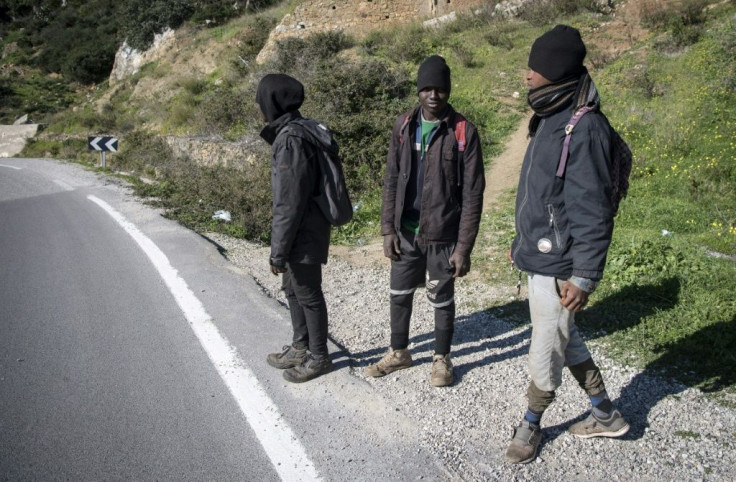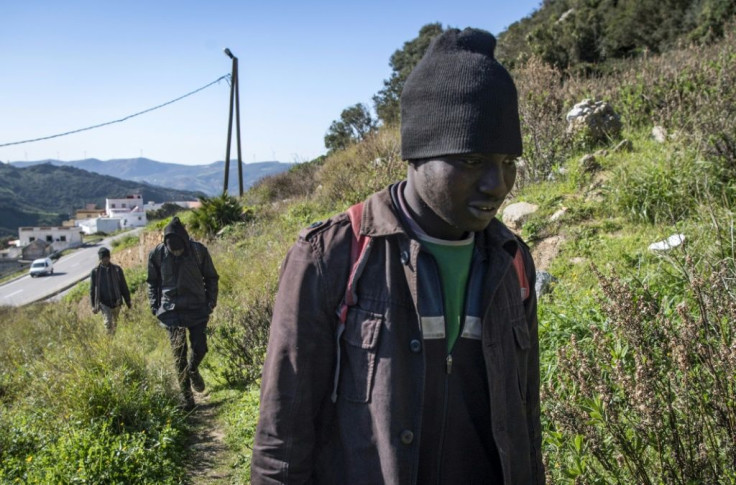Morocco Border Clampdown Thwarts Europe-bound Migrants

Mustapha left his home in Guinea two years ago to make the arduous journey to Morocco, hoping to cross the fence separating the kingdom from the Spanish enclave of Ceuta.
"We're going to cross this barrier," he told AFP, in defiance of increasing pressure on migrants from Moroccan authorities, supported by Europe.
A few months ago, migrants like Mustapha were a common sight on roadsides or in camps near urban centres.
Today, those aiming to reach Europe from Morocco prefer to stay hidden, fearing the waves of arrests that have elicited condemnation from NGOs.
In recent months, European pressure to shore up borders -- bolstered by funding -- has pushed Morocco to clamp down on migration.
Two years after leaving Guinea, Mustapha, now 18, lives in abject poverty in a hideout in the Belyounech forest, a few kilometres (miles) from Ceuta on Morocco's northern coast.
Cautiously, he ventures out to beg at the side of a road for a few coins, water or food, but it is rare that passing cars pay him any attention.
"My dream is to go live in Norway and be a DJ," said the young man, wearing worn-out shoes and a black beanie, a colourful school satchel over his shoulder.
"I dropped out of high school for this trip."
Travelling with two companions from the same neighbourhood back home, Ahmed and Omar, both 17, Mustapha took a perilous journey from Conakry, traversing Mali and Algeria, before crossing the closed border to enter Morocco.
"That part was not easy," he said.
To reach Ceuta, the trio needs to cross the barbed wire barrier which, along with the fence around the other Spanish enclave of Melilla, mark the only land borders between Africa and Europe.

The fence cuts across fields and forests, and Moroccan auxiliary force vehicles are posted along the border.
Like Mustapha, many migrants live in precarious encampments deep within forests, keeping out of sight.
Local aid groups are no longer authorised to meet with them, according to testimony gathered by AFP.
In Nador, a town bordering Melilla, the Moroccan Association of Human Rights has condemned "serious and repeated violations", with migrants "illegally detained in very difficult conditions" and "deportations" to regions far from transit routes.
"The authorities come into the forest looking for us and, if they find us, they send us back," Mustapha said.
"They are looking for us today even," said his companion Omar, but added he was ready to seize "the right opportunity to get across" the fence.
A day later, Moroccan authorities announced they had blocked 400 migrants from sub-Saharan Africa from entering the Spanish enclave in an operation that resulted in injuries to both migrants and security forces.

Migrants who are detained by authorities are sent to southern Morocco by bus or returned by air to their country of origin, according to testimony collected by AFP.
Khalid Zerouali, who is in charge of migration and border monitoring at the interior ministry, told AFP that measures Morocco put in place in 2019 after sustained pressure to tackle "irregular migration" were aimed at trafficking networks.
"Our security measures do not target migrants because, in our view, they are the victims," he said.
Morocco has led two "regularisation" campaigns since 2014, offering residency permits to 50,000 illegal migrants.
According to the European Union border security agency, Frontex, Guineans in recent years have been among the largest groups trying to reach Europe via Morocco.
"We decided to leave for a better future. We found nothing to do in Guinea," Omar said.
Ahmed dreams of being a "professional footballer in Europe".
"I play midfield. I want to go to Germany, if they let me in," he said, a striped scarf around his neck to ward off the cold.
Despite the challenges, the boys say they still prefer Morocco to the Libyan route.
"There is violence there. My friends tried to get through and told me it was hard," Ahmed said.
Like many young people seeking a better future, the trio cling to a romanticised image of life in Europe, though they seem to know little about it.
While they are just a few of the many that try to get through the barriers around Ceuta and Melilla, others attempt to reach Europe by crossing the Mediterranean in makeshift boats.
"I can't afford to go by sea, it's too expensive," Ahmed said.
In recent months, Moroccan authorities have stemmed the flow of migrants into Europe.
According to the Spanish interior ministry, nearly 32,500 migrants entered Spain in 2019 by land and sea routes, down by nearly half from 2018.
But the number of migrant drownings in the western Mediterranean remains high: 325 deaths were recorded in the first 10 months of 2019, compared to 678 for the same period in 2018.
Zerouali said last year, "around 74,000 attempts to immigrate irregularly to Spain were blocked by Moroccan law enforcement," compared to 89,000 in 2018.
In 2019, the European Union allocated 140 million euros ($155.3 million) to support Morocco's efforts against irregular migration, with Spain also providing additional aid to its southern neighbour.
But even as Morocco works to tackle migration via its territory, it says it will not act as Europe's police force.
© Copyright AFP {{Year}}. All rights reserved.





















